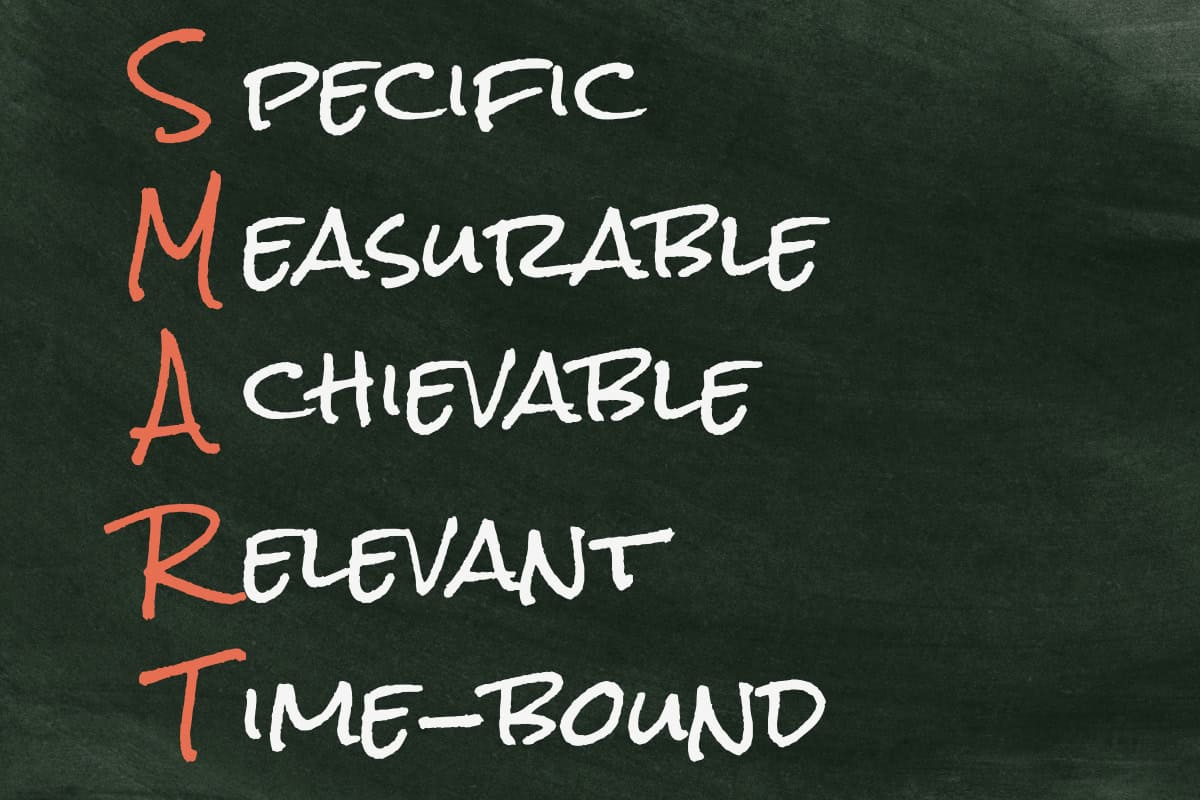My content may contain 3rd party affiliate links for products I use and love. If you take action (i.e. subscribe or purchase) after clicking one of these links, I'll earn some coffee money ☕ which I promise to drink while creating more helpful content.

Introduction
Ever catch yourself staring at that list of goals, feeling like they're floating just out of reach? (I still remember the year I had FIFTEEN different resolutions... not one of my finest goal setting techniques). You're in good company. While 92% of people watch their dreams fade into the someday pile, there's a small group who quietly, consistently turn their visions into reality... and here's what I've discovered: their secret isn't iron willpower or lucky breaks. It's something far more accessible.
After years of struggling with this, I finally found out what ACTUALLY works. I've identified 5 powerful techniques that successful people use to stay focused and deliver results. These aren't just feel-good theories... they're practical strategies that blend modern psychology with real-world application.
Whether you're mapping out your career progress, reimagining your health journey, building your side gig into a full-time business, or finally ready to write that book that's been living in your heart, you're about to discover the framework that makes the impossible feel wonderfully inevitable.
What if this could be the year your dreams finally met their deadline?
Why Goal Setting is Essential for Focus and Success
Have you ever noticed how the most successful people seem to move through life with unwavering clarity? It's not just luck or natural talent... it's the power of intentional goal setting. (I'll never forget my own lightbulb moment: the year I stopped treating my dreams like a wish list and started approaching them as a strategic plan).

At its core, effective goal planning does something remarkable for your mind: it transforms vague wishes into crystal-clear destinations. Think of it like programming your brain's GPS - when you know exactly where you're heading, your mind naturally begins filtering out distractions and spotting opportunities that align with your objectives.
This mental focus isn't just productive... it's actually how our brains are wired to function at their best.
The psychological benefits run even deeper. When you engage in structured goal planning, you're not just creating a to-do list - you're actually rewiring your brain's motivation centers. Research shows that the simple act of setting clear objectives triggers a cascade of positive changes: increased dopamine production (your brain's reward chemical), enhanced self-confidence, and a stronger sense of personal control. These aren't just feel-good effects... they're the building blocks of sustained motivation.
But here's what often trips people up: trying to navigate through life without defined goals is like setting sail without a destination. I see it all the time - talented individuals who find themselves:
The good news? These are all solvable challenges. Strategic goal planning isn't just about writing down wishes - it's about creating a framework that naturally generates focus, builds momentum, and keeps you moving forward even when motivation dips. And that's exactly what the techniques we're about to explore will help you achieve.
What could become possible in your life with the kind of clarity that turns "someday" dreams into "today" actions?
SMART Goals: The Foundation of Effective Goal Setting

Remember that vague goal you set last year? You know the one... "get healthier" or "grow my business" or "be more productive"? (I used to be the king of fuzzy goals until a mentor asked me one question that changed everything: "How will you know when you've achieved it?"). This is where SMART goal setting becomes your secret weapon for turning good intentions into real results.
Let's break down what makes a goal SMART and why each element is crucial for your success:
Specific
Your goal needs crystal-clear definition. Instead of "get healthier," a specific goal might be "establish a consistent morning exercise routine." This clarity eliminates the mental fog that often leads to procrastination.
Measurable
This is where you define your victory conditions. A measurable goal includes concrete numbers or clear milestones. For example, "complete 30 minutes of strength training three times per week" gives you an unambiguous way to track your progress.
Achievable
While it's great to dream big, your immediate goals need to live in the realm of possibility. (Trust me - I learned this lesson after setting a goal to double my income in one month... and watching my motivation crash when reality hit). Your goals should stretch you without breaking you.
Relevant
Every goal needs to align with your bigger vision. Ask yourself: "Does this goal support where I want to be in five years?" This prevents you from chasing objectives that look good on paper but don't truly serve your journey.
Time-Bound
Without a deadline, a goal is just a wish. Setting a clear timeframe creates healthy pressure and helps you break down your goal into manageable steps.
Here's how this transforms common goals into actionable plans:
Vague Goal: "Grow my business"
SMART Version: "Acquire 20 new clients through LinkedIn outreach by June 30th, with a minimum project value of $2,000 each"
Vague Goal: "Read more books"
SMART Version: "Read 24 business and personal development books by December 31st, completing one book every two weeks"
The power of SMART goals lies in their ability to create instant clarity. When you define goals this way, your brain stops wasting energy on the "how" and "when" and starts focusing on taking action.
You'll find yourself naturally breaking down larger objectives into manageable steps, measuring progress more effectively, and staying motivated through visible achievements.
What goals have you been carrying around in the "someday" category that could benefit from the SMART framework?
The Power of Micro Goals

Have you ever felt paralyzed by the sheer size of your dreams? (I still remember staring at my laptop, overwhelmed by the goal of writing my first e-book... until I discovered the magic of thinking smaller to accomplish something bigger).
Here's what successful goal-achievers understand: the path to any major accomplishment isn't paved with giant leaps... it's built on micro goals - those small, doable next-actions that slowly but surely create unstoppable momentum. Think of micro goals as your daily stepping stones toward that bigger vision.
Let's look at how this works in practice. Instead of being overwhelmed by "launch an online business," you might break it down like this:
- Week 1: Research and list 3 potential business ideas
- Week 2: Create simple landing pages for each concept
- Week 3: Share with 20 people in your target audience for feedback
- Week 4: Choose your focus based on feedback and draft a basic action plan
See how much more do-able that feels? Each micro goal creates a clear, achievable next-action that your brain can process without triggering resistance or overwhelm.
Here's another example that transforms the daunting goal of "get in shape" into actionable micro goals:
- Month 1: Walk 15 minutes daily after dinner
- Month 2: Add 5 minutes of basic stretching to morning routine
- Month 3: Include one strength training session per week
- Month 4: Gradually increase to three weekly strength sessions
The psychology behind this approach is fascinating... and proven. Each time you complete a micro goal, your brain releases dopamine - that feel-good chemical that reinforces positive behaviors. You're literally building a success habit with every small win, creating what psychology researchers call the "progress principle" - the more small wins you experience, the more motivated you become.
But here's the real secret about micro goals: they're not just about making big goals less overwhelming... they're about maintaining focus through visible progress. When you can see yourself moving forward (even in small steps), you're far more likely to stay committed to your larger vision.
Want to try it yourself? Think about one of your bigger goals right now. What would it look like broken down into weekly or even daily micro goals
Remember, the smaller and more specific these steps are, the more likely you are to actually take action.
What intimidating goal have you been putting off that might become possible with a micro goal approach?
Visualization: See It to Achieve It

You've probably read about visualization in books like 'Think and Grow Rich' or heard elite athletes describe 'seeing' their victory before it happens... but be honest - have you ever actually put this technique into consistent practice? (I get it - I spent YEARS nodding along to visualization success stories while never making time for it myself. Then I finally committed to just 5 minutes of morning visualization for my quarterly goals... and watched my follow-through rate practically double).
The science behind visualization is remarkably straightforward: your brain actually has trouble distinguishing between a vividly imagined experience and a real one. When you consistently visualize your goals, you're essentially programming your mind to recognize and act on opportunities that align with your vision. It's like creating a mental blueprint that your subconscious mind works to fulfill.
So how do we do that?
Create a Clear Mental Picture
Think about your goal in vivid detail. If you're building your business, imagine yourself confidently hosting your first successful webinar, seeing those early-morning payment notifications pop up on your phone, or working productively from your favorite spot at home while your passive income grows.
Engage all your senses - what does it feel like to hit 'send' on that first email broadcast? Can you hear yourself naturally explaining your business to that new prospect? Can you feel the satisfaction of closing your laptop after a productive day where YOU set the schedule? The more detailed your mental picture, the more real it becomes to your brain.
Design Your Vision Board
Man, I fought this one for too long. Vision boards are almost a cheat code.
A vision board is a tangible representation of your goals. It could include pictures, quotes, or words that resonate with what you want to achieve.
You can build them using magazine cutouts or printed images off the net. You can create digital versions using tools like Pinterest or Canva. The key is selecting images and words that trigger a genuine emotional response. Place your board where you'll see it daily - maybe your home office wall or as your phone's wallpaper.
I have one on the wall right above my desk. Another version on my computer desktop. and still another on my phone. I try to constantly remind myself what it is I'm working for.
Practice Guided Imagery
Take 5-10 minutes each morning to sit quietly and run through this simple exercise:
Contrary to what I used to think, this isn't some wierd wooh-wooh nonsense.
Olympic swimmer Michael Phelps used visualization as part of his training. Before every race, he visualized himself swimming perfectly, step by step, down to every stroke. This mental preparation gave him the focus and confidence to dominate in the pool.
In business, Sara Blakely, founder of Spanx, visualized her product being sold in major retailers years before it happened. She even wrote herself a check for $1 million dollars and kept it in her vision board - long before she actually earned it.
But here's what many people miss about visualization: it's not just about seeing the end result... it's about visualizing the process and the person you need to become. When you regularly engage in this practice, you naturally begin making decisions and taking actions that align with your visualized future.
What would it feel like to spend just 5 minutes tomorrow morning seeing yourself already achieving your biggest goal?
Accountability and Support: Staying on Track

Staying focused on your goals can be tough when you’re going it alone. That’s where accountability and support come in. Having someone in your corner—whether it’s an accountability partner, mentor, or supportive group—can make all the difference. They’ll help you stay motivated, celebrate your wins, and call you out (in a good way) when you’re slacking.
Find an Accountability Partner or Mentor
Choose someone who will keep you honest about your progress. This could be a friend, colleague, or even a coach. Regular check-ins—whether weekly or monthly—can help you stay on track and push through challenges. A mentor adds an extra layer of guidance, offering insights from someone who’s been where you want to go.
Use Goal-Tracking Apps
Technology can be a great motivator. Apps like Trello, Habitica, or Let's Goal let you track your goals, set deadlines, and get reminders. Some apps even gamify the process, turning goal-setting into a fun challenge. Seeing your progress visually—like completing a streak or hitting a milestone—can give you a dopamine boost that keeps you moving forward.
Join a Group Challenge or Community
One of the great things I’ve found about MLM is the community you find that rallies around you to help you win the game. It’s not just about individual success; it’s about everyone working together and lifting each other up.
Whether it’s cheering each other on in a group chat, attending team meetings, or celebrating collective wins, being part of a supportive community keeps you accountable and motivated. It’s easier to stay focused when you know others are walking the same path and rooting for you to succeed.
Celebrate Milestones
Achieving a goal, no matter how small, deserves recognition. Break big goals into smaller milestones and reward yourself when you hit them. It could be something simple, like a favorite treat, or something bigger, like a weekend getaway. Celebrating progress reinforces positive behavior and makes the journey enjoyable.
One thing I've been playing with lately is documenting my wins - big and small. I keep a "wins journal" in a dedicated OneNote page where I record every milestone. On those days when I'm having trouble maintaining momentum, this gives me tangible evidence that I CAN and DO achieve what I set out to do. Might be worth a try.
Turning Your Dreams into Reality: Your Next Steps

The journey from dream to done isn't about finding the "Easy" button. I know; I've looked.
The road to the life you want is through implementing proven techniques consistently. We talked about how SMART goals create your foundation, micro goals maintain your momentum, visualization primes your mind for success, and accountability ensures you stay on track.
But here's the thing that matters now: taking that first step. (I've seen too many aspiring entrepreneurs file away great strategies for "someday" - don't let that be your story).
Instead:
- Choose ONE goal that excites you
- Apply the SMART framework to clarify it
- Break it down into weekly micro goals
- Spend 5 minutes tomorrow morning visualizing it
- Reach out to one potential accountability partner
Remember: the 8% who consistently achieve their goals aren't smarter or more talented... they simply have better systems. By implementing these goal-setting techniques, you're not just creating a plan - you're developing the mindset and habits that make success inevitable.
What goal will you start applying these techniques to today? Your future self will thank you for taking action now.
Need help getting started? Download my free goal-setting worksheet and start crushing your goals now!


